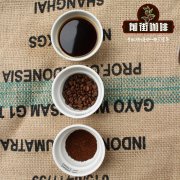Salanto Manor, a boutique coffee estate from the Colombian Coffee Delta

Professional coffee knowledge exchange more coffee bean information please follow the coffee workshop (Wechat official account cafe_style)
Colombia, whose full name is the Republic of Colombia, is located in South America, next to Brazil. Its name actually comes from Columbus, the famous navigator who led Europeans to discover America.
Colombian coffee, which dates back to the Spanish colonial era in the 16th century, is one of the country's famous "four treasures" (the other three are gold, emeralds and flowers).
Colombia attaches great importance to coffee cultivation, is the world's largest exporter of washed coffee, the largest exporter of Arabica coffee, the second largest producer of coffee (after Brazil), and has its own coffee spokesman image "Uncle Juan".
Colombian coffee has long been divorced from the impression of shoddy and base coffee. Through coffee competitions in recent years, people know more about Colombian coffee. Good coffee usually comes from good estates and some small and special producing areas such as Narino, but these coffee production is really not much. Before the coffee competition, Colombian coffee was graded by the size of coffee beans. But this rating only represents that there is no relative relationship between the size and quality of coffee beans.
Is better "this is an outdated grading system, on the contrary, some excellent coffee farms or cooperatives with small yields and small farming areas produce smaller, more round and complete coffee beans, which is the mainstream of coffee in Colombia today. good quality is the guarantee of price.
Colombian coffee is widely sold and used, mainly because Colombian coffee has a soft and pure taste, and it is very easy to brew coffee beans, so it is very popular in every family and is the best partner for dessert cake. With Colombian coffee, you can enjoy the mellow atmosphere brought by bar without coffee. Whether it is simple black coffee or Colombian coffee formula coffee is a good choice.
Salento is a small town in the heart of the Colombian Coffee Delta. Its exquisite streets and Paisa-style colored buildings make it as famous as the coffee produced here.
Compared with large-scale coffee plantations in other countries, most farms in Colombia are grown on a large scale on a household basis, but in large quantities. Affected by the weather and soil, Colombian coffee beans have natural flavors of cocoa beans, fruit and caramel.
Just as only wine produced in the champagne region of France can be called champagne, only coffee produced in Colombia and picked by hand can be called "Colombian coffee". Colombian coffee is one of the few original coffee sold in the world under the name of the country. In terms of quality, it has won praise unmatched by other coffee.
Colombian coffee is divided into more than 200 grades, which means that the coffee is very regional. The country's coffee-producing areas are located in the Andes, where the climate is mild and the air is humid. Colombia has three Codiera mountains running north and south, right into the Andes. Coffee is grown along the highlands of these mountains. The mountain steps provide a diverse climate, where the whole year is the harvest season, and different kinds of coffee ripen at different times.
And fortunately, unlike Brazil, Colombia doesn't have to worry about frost. There are about 700 million coffee trees in Colombia, 66% of which are planted in modern plantations and the rest on small traditionally run farms.
The Umei acid, which is rare in Colombian coffee, is not astringent and bright and delicate, smooth taste is not traditional Colombian rich style but has a bit of Costa Rican coffee flavor, acid turns plum sweet very quickly.
Important Notice :
前街咖啡 FrontStreet Coffee has moved to new addredd:
FrontStreet Coffee Address: 315,Donghua East Road,GuangZhou
Tel:020 38364473
- Prev

El Salvador Cup Test Presidential Award winning Manor MalacaraC Maracala C Manor Honey treated beans
Professional coffee knowledge exchange more coffee bean information please follow the coffee workshop (Wechat official account cafe_style) El Salvador is the smallest country in Central America, the most densely populated country, most areas of the main crops are coffee beans, but do not forget its existence because of its mini, 60% of the coffee in El Salvador is Bourbon varietal bourbon.
- Next

Brazil-Samamba Manor Yellow Bourbon peeled and sunburned, sweetness, good flavor and clean characteristics
Professional coffee knowledge exchange more coffee bean information please pay attention to the coffee workshop (Wechat official account cafe_style) Brazil is the world's largest coffee producer, but also South America's largest land-based country; land and population ranked fifth in the world, with the world's largest rainforest and the widest watershed of the Jamason River, the equator passes through the northern region, while the central and southeastern regions are mostly high.
Related
- Does Rose Summer choose Blue, Green or Red? Detailed explanation of Rose Summer Coffee plots and Classification in Panamanian Jade Manor
- What is the difference between the origin, producing area, processing plant, cooperative and manor of coffee beans?
- How fine does the espresso powder fit? how to grind the espresso?
- Sca coffee roasting degree color card coffee roasting degree 8 roasting color values what do you mean?
- The practice of lattes: how to make lattes at home
- Introduction to Indonesian Fine Coffee beans-- Java Coffee producing area of Indonesian Arabica Coffee
- How much will the flavor of light and medium roasted rose summer be expressed? What baking level is rose summer suitable for?
- Introduction to the characteristics of washing, sun-drying or wet-planing coffee commonly used in Mantenin, Indonesia
- Price characteristics of Arabica Coffee Bean Starbucks introduction to Manning Coffee Bean Taste producing area Variety Manor
- What is the authentic Yega flavor? What are the flavor characteristics of the really excellent Yejasuffi coffee beans?

